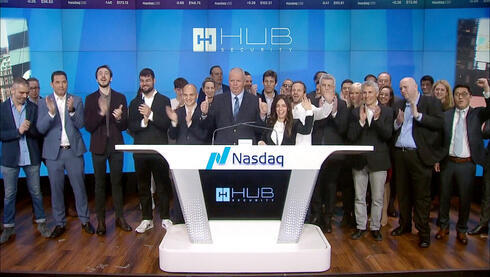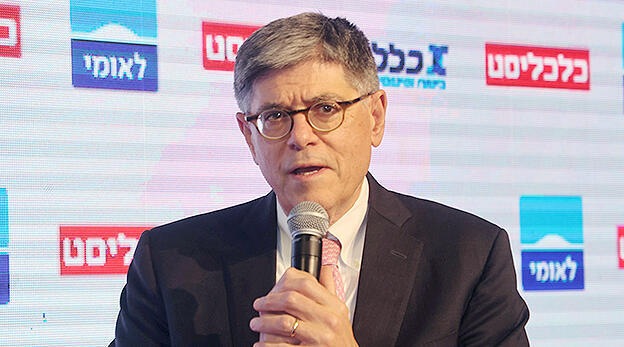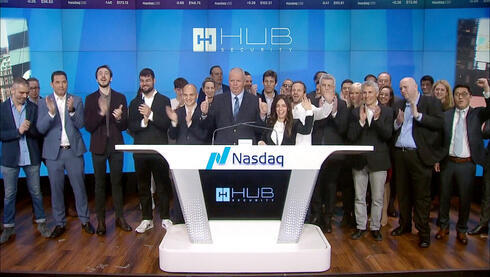
How did Hub Security go from a $1.3 billion valuation to potential bankruptcy in six months
How did Hub Security go from a $1.3 billion valuation to potential bankruptcy in six months
The Israeli cyber company, which merged with a SPAC in February, began trading on Nasdaq at a value of $1.3 billion. However, since then, the founder was suspected of embezzlement and left, the stock plummeted, the coffers emptied, and the 2022 reports, which were submitted only this week, feature a note regarding the company's ability to continue as a going concern
Broken promises, forecasts that have gone wrong, deep losses and doubts about the continued existence of the company - this is all that remains of Hub Security's giant Wall Street IPO. In less than six months, the company has seen its valuation plunge from $1.3 billion to just $58 million, wiping out over 95% of its value.
On Tuesday, the Israeli cyber company that has been trading on Nasdaq since it merged with a SPAC at the end of February, published its financial reports for 2022. It did it half a year late. The delay is due to a lack of expertise in preparing reports at the company. And now that they have been published, they mainly contain warning signs, including a note regarding the company's ability to continue as a going concern, which means that there is doubt that the company will continue to exist in the next 12 months.
The major shareholders of Hub Security are Viserion (12.9%), Evan Charles Neumann (10.5%), who was one of the controlling owners of Max Stock, the Israeli venture capital fund OurCrowd (4.8%) and insurance company The Phoenix (3.3%).
Hub Security concluded 2022 with a net loss of $80 million and a total loss of $85.5 million. All this while the net loss in 2021 was $13.1 million. And so, within three years, the company accumulated losses of $99 million. Its equity is negative in the amount of $24.6 million and as of December 31, 2022, the company had cash and cash equivalents, restricted cash and deposits in the amount of $5.6 million. Operating cash flow for the full year of 2022 was $23.4 million. For this reason, a note regarding the company's ability to continue as a going concern was added to the report by the company's accountants.
Hub Security's revenue in 2022 was $79.7 million, a 145% increase compared to revenue of $32.5 million in 2021. On the face of it, this is good news, but it also includes a huge asterisk. The company operates in two areas: developing hardware and software to protect organizations' data that sits in short-term memory (RAM); and providing regular cyber services to businesses. The second field of activity generated revenues of $78 million, while in 2021 it generated revenues of $31.6 million.
The revenues from original technology are far from the forecast
One of Hub Security’s problems is that the revenues derived from the sale of the company's original technology amounted to only $1.7 million. According to the forecast provided by Hub Security prior to its entry into Nasdaq, it claimed it would end 2022 with revenues of $38 million from this field of activity, and the current year with revenues of $92 million, which now seems far-fetched to the point of being impossible. Evidence of this can be found in the current report, with Hub Security refraining from providing forecasts.
Administrative and general expenses stood at $57.6 million at the end of the year - an almost 6-fold jump compared to expenses of $9.4 million in 2021. Among other things, this section includes a payment to the Israeli company A-Labs, which advised it in the merger process with the SPAC, and is also currently responsible for finding new investors for the company. Between July 2021 and March 2023, Hub Security paid the company $4.2 million. Half of the amount was converted into shares of Hub Security at a price of $10 per share, while today the share price stands at 60 cents. In addition, Hub Security granted A-Labs options to purchase 4 million additional shares at a price of NIS 4.81 ($1.27) per share for four years. Hub Security pays $70,000 a month to A-Labs, and also gives it an annual marketing budget of $280,000, in order for it to find new investors.
Hub Security was established in 2017 by former CEO Eyal Moshe, and in June 2021, at the height of the wave of IPOs, became a public company on the Tel Aviv Stock Exchange through a merger with the skeleton company. As part of the merger, the company raised NIS 163 million ($43 million) at a value of NIS 475 million ($125 million). Last February, even before completing the SPAC merger, the company was delisted from the TASE.
At the end of February, Hub Security completed the merger with the SPAC company Mount Rainier at a value of $1.3 billion. At the time when it was delisted from trading in Tel Aviv, the value of the company was only about a quarter of a billion dollars. The investors who invested in the SPAC that merged with Hub redeemed their investment, in accordance with the right they received at the time of the offering, and the PIPE investors, did not transfer the funds they promised, which forced Hub Security to enter into an equity line agreement, which characterizes companies in problematic situations. This move includes getting a line of credit in exchange for shares and option.
Founder left, suspected of using company funds for a private purpose
According to the reports for 2022, Hub Security has a credit line of one million dollars and does not meet the financial conditions established within it, and therefore the credit line was classified as a short-term loan. All of this led to a dramatic 95% plunge in the value of the stock, from $10 at the time of the merger to 60 cents today, so the company, which started trading at a valuation of $1.3 billion, is currently trading at a paltry value of only $58 million.
On top of all these difficulties, the company suffered from other dramas. The founder Moshe and his partner Ayelet Bitan, who served as VP of Human Resources, left the company against the backdrop of the establishment of an independent committee, which is investigating suspicions that the couple used the company's funds for private needs, including the renovation of their house in Tel Aviv. External directors also left Hub Security prior to the completion of the merger. Moshe's place was taken by Uzi Moskowitz, who was previously a director at the company and reached the rank of general in the IDF.
According to the company, the investigation against Moshe is also one of the reasons for the delay in publishing the reports. But there are other reasons. According to the report, the company lacks personnel with an adequate level of accounting knowledge and experience. The monitoring of accounting transactions carried out by the company was not planned or operated properly and efficiently. In addition to deficiencies in the planning and operation of the procedures relating to the timely closing of the company's financial books at the end of the quarter and the year, there is also insufficient supervision of the signature rights related to the company's accounts. The information technology controls also did not work and a complete separation of roles was not carried out in some of the transactions and processes.














